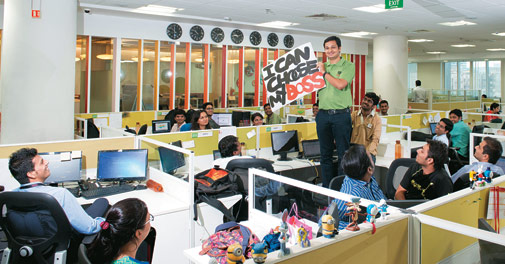Fractal Analytics allows employees unprecedented elbow room to decide their career paths.

Six months ago, Vaibhav Dalal changed his manager at Fractal Analytics. An engineering graduate from Mumbai University and an MBA from XLRI Jamshedpur, Dalal, 31, who joined the analytics provider 14 months ago, was heading a digital and e-commerce project before switching to marketing.
The move happened after Dalal’s conversation with Careen Foster, Fractal’s Chief Marketing Officer. He spoke to her about how marketing was defining programmes, and shared his knowledge on how his team was generating insights on brands’ digital impact for some Fractal clients. He offered to work on measuring Fractal’s digital impact on an assignment basis. The marketing team then realised how valuable his work was. “I was excited with this opportunity. Thanks to the ‘People Principle’ policy, I initiated a discussion with my delivery manager, and he accepted my decision to move. As per the process, a person was identified to backfill my role, and the transition was done in just six weeks,” says Dalal. At most other companies, he would have had to quit and find another job if he contemplated such a change, but not at Fractal.
People Principle was introduced about six months ago to help create an environment of freedom and trust among Fractal employees. The leadership team’s vision is that all employees should enjoy the same level of trust as senior executives. People Principle has elements such as the ‘Wikification’ of company policy (allowing employees to amend it), self-regulation in matters such as expense claims, leave and dress codes, and a performance evaluation that is divorced from rankings. It gives employees the freedom to choose desired roles, projects, managers, mentors and even change career tracks.
IN VIDEO: Fractal Analytics employees on how it feels to choose their own boss
Fractal was co-founded in Mumbai in 2000 by Srikanth Velamakanni, now CEO, Pranay Agrawal, currently Executive Vice President-Global Consulting, and three others. Now, it’s run by Velamakanni and Agrawal, who met as students at the Indian Institute of Management, Ahmedabad. It serves clients in over 100 countries through 11 offices globally and believes that employees give their best when they are not hemmed in. In fact, 50 others have already followed Dalal, making use of the career-altering initiative (People Principle) he took advantage of.
What makes Fractal Analytics different
> Allows employees to move between departments, in effect choose their own bosses
> Gives employees the freedom to choose their work timings, and also the option to work from office, home or anywhere else
> Provides the full and final settlement of a departing employee on his/her last day itself
> Does not track employee leave
Fractal has 700 employees and aims to raise its staff strength to 1,000 globally by the end of 2014. The company has emulated some other best practices of global companies as well, such as not tracking its employees’ vacation time and leaving them alone to work in freedom. The first was learnt from Netflix, the second from Google.
Fractal asks its employees to set their own targets and then self-determine their goal achievement percentage, which is the basis of their salary increments and variable pay. Velamakanni says only one-third employees chose that they exceeded 110 per cent of their goals – the highest bracket – even though everyone could have chosen that category. “It shows that we let people govern themselves, and they do not misuse the freedom,” he says.
Also, Fractal never questions or audits the reimbursement bills of employees. It pays out the full and final settlement of a departing employee on the latter’s last day at work itself. Information is freely shared – and not, as in most companies, on a ‘need-to-know’ basis. Employees choose their work timings, with no specific ‘in’ time or ‘out’ time. They are also allowed to work from home.
Velamakanni says the main aim of these practices is to reduce professional stress in employees as much as possible. “We want to take the noise away from things like performance appraisals and rankings as it takes attention away from the real stuff. People here are happy and focused.”
Most encouraging of all, such radical departure from accepted corporate practices has not impacted Fractal’s top line. It clocked around Rs 300 crore revenue in 2012/13. “Analytics has become important. In the past year, 12 CXOs of companies, of sizes between $10 billion and $100 billion, have visited us,” says Velamakanni. Fractal has set itself the goal of reaching Rs 600 crore revenue in the next two years, going on to touch Rs 1,000 crore at which state it can become a listed company, he adds. Velamakanni wants Fractal to be the ‘BMW’ of analytics. “If we take great care of our people, our people will take care of our clients.”
